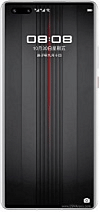Popular Products
Compare Huawei Mate 30 RS Porsche Design Vs Apple iPhone 15 Pro Max
Should you buy Huawei Mate 30 RS Porsche Design or Apple iPhone 15 Pro Max? Well, your search ends here. Find out which mobile phone is best for you - Compare the two models on the basis of their Price in Pakistan, Body, Display, Storage, Connectivity, Camera, and Performance. Huawei Mate 30 RS Porsche Design starts at PKR 560,691 and Apple iPhone 15 Pro Max starts at PKR 546,858.
Huawei Mate 30 RS Porsche Design has screen size of 6.5 inches and Apple iPhone 15 Pro Max has screen size of 6.7 inches
. Huawei Mate 30 RS Porsche Design comes up with internal storage of 512GB and RAM of 12GB. Apple iPhone 15 Pro Max comes up with internal storage of 1TB and RAM of 8GB.
Check detailed comparison below to compare specification for both models. Don't forget to check out expert opinion as well.
Huawei Mate 30 RS Porsche Design Vs Apple iPhone 15 Pro Max
| Specifications | Huawei Mate 30 RS Porsche Design | Apple iPhone 15 Pro Max |
|---|---|---|
| Screen Size | 6.5 inches | 6.7 inches |
| Chipset | Snapdrogen 8+Gen 2 | Apple Bionic A17 Pro |
| RAM | 12GB | 8GB |
| Internal Storage | 512GB | 256GB |
Compare Models
Summary | |||
| Specs Score | 76 | ||
| OS | iOS v17 | ||
| Screen Size | 6.5 inches | 6.7 inches | |
| Chipset | Snapdrogen 8+Gen 2 | Apple Bionic A17 Pro | |
| RAM | 12GB | 8GB | |
| Internal Storage | 512GB | 256GB | |
GENERAL | |||
| Sim | Single SIM (Nano-SIM) or Hybrid Dual SIM (Nano-SIM, dual stand-by) | Dual Sim, GSM+GSM | |
Similiar Alternatives
- Huawei Mate 30 RS Porsche Design
- Apple iPhone 15 Pro Max
DESIGN | |||
| Weight | 188 g (6.63 oz) | 221g | |
| Body Material | Glass front, glass back, aluminum frame | ||
DISPLAY | |||
| Screen size | 6.5 inches | 6.7 inches | |
| Screen resolution | 1344 x 2772 pixels | 1290x2796pixels | |
| Technology | OLED (Corning Gorilla Glass 6) | ||
| Aspect Ratio | 18.5:9 ratio | 19.5:9 | |
PERFORMANCE | |||
| Chipset | Snapdrogen 8+Gen 2 | Apple Bionic A17 Pro | |
| CPU | Octa-core (2x2.86 GHz Cortex-A76 & 2x2.36 GHz Cortex-A76 & 4x1.95 GHzCortex-A55) | 3.78GHz, Hexa Core Processor | |
| GPU | Mali-G76 MP14 | Apple Pro Class 6-Core GPU | |
| RAM | 12GB | 8GB | |
STORAGE | |||
| Internal Storage | 512GB | 256GB | |
| Card Slot | NM (Nano Memory), up to 256GB (uses shared SIM slot) | No | |
CAMERA | |||
| Video Recording | 4K, 1080p, gyro-EIS | 4K@24/25/30/60fps UHD, 1080p | |
| Camera Features | Leica optics, LED flash, panorama, HDR | Photonic Engine, Deep Fusion, Smart HDR 5, Next-generation portraits with Focus and Depth Control, Portrait Lighting with six effects, Night mode, Night mode portraits enabled by LiDAR Scanner, panorama, Photographic Styles ,Macro photography Apple ProRAW Wide color capture for photos and ,Live Photos, Lens correction (Ultra Wide) ,Advanced red-eye correction ,Auto image stabilization, Burst mode, Photo geotagging, 12MP 2x Telephoto (enabled by quadpixel sensor): 48 mm, ƒ/1.78 aperture,, 10x opt | |
BATTERY | |||
| Type | 4500 mAh | 4422mAh, Li-ion Battery | |
| Stand By | No | ||
| Talk Time | No | ||
CONNECTIVITY | |||
| GPRS | Yes | Yes | |
| Edge | Yes | ||
| Bluetooth | 5.2, A2DP, aptX HD, LE | Yes, v5.3 | |
| USB | USB Type-C 3.1, USB On-The-Go | Yes, USB-C v3.0 | |
| GPS Facility | Yes, with dual-band A-GPS, GLONASS, BDS, GALILEO, QZSS, NavIC | yes with A-GPS, GPS, GLONASS, Galileo, QZSS and BeiDou | |
| Speed | HSPA 42.2/5.76 Mbps, LTE-A, 5G | ||
NETWORK SUPPORT | |||
| 3G | Yes | Yes | |
| 5G | Yes | Yes | |
| 2G | Yes | ||
| 4G | Yes | Yes | |
MORE FEATURES | |||
| Sensors | Fingerprint (under display, optical), accelerometer, gyro, proximity, compass, color spectrum | Face ID, LiDAR Scanner, Barometer, Threeaxis gyro, Accelerometer, Proximity sensor, Ambient light sensor | |
| Other Features | 40W Quick Charging, NFC, AI Camera, Wireless Charging, Face Unlock | ||
| Quick Charging | Fast battery charging 66W | Yes | |
Similiar Comparisions
- Apple iPhone 15 Pro Max
Popular Mobile
- Under 25K
- 25-50K
- 50-1Lac
- Above 1Lac
Detailed Comparison of Huawei Mate 30 RS Porsche Design vs Apple iPhone 15 Pro Max
Performance Comparison: Huawei Mate 30 RS Porsche Design vs Apple iPhone 15 Pro Max
Chipset, one of the important feature of the mobiles used in these Mobiles are Snapdrogen 8+Gen 2 and Apple Bionic A17 Pro respectively. Huawei Mate 30 RS Porsche Design comes up NM (Nano Memory), up to 256GB (uses shared SIM slot) card slot and Apple iPhone 15 Pro Max comes up with No card slot. CPU used in Huawei Mate 30 RS Porsche Design is Octa-core (2x2.86 GHz Cortex-A76 & 2x2.36 GHz Cortex-A76 & 4x1.95 GHzCortex-A55) and used in Apple iPhone 15 Pro Max is 3.78GHz, Hexa Core Processor.
